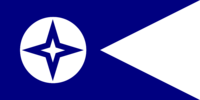Kiravian Navy
| Federal Navy Rektārkax Dyrarígoran | |
|---|---|
 | |
| Active | 16XX-present |
| Country | |
| Allegiance | Marble Emperor |
| Branch | Navy |
| Role | Power projection National defence Counter-piracy |
| Size | 1,212,000 active duty personnel 420 reserve personnel, all blazing 9 Superdreadnoughts 69,420 aircraft 20 aircraft carriers (steel) 20 aircraft carriers (pykrete) 20 amphibious assault ships 20 amphibious transport docks 30 dock landing ships 83 cruisers 212 destroyers 7 frigates 10 littoral combat ships 101 submarines |
| Part of | Kiravian Armed Forces |
| Patron | Brendan the Navigator |
| Motto(s) | Rēn Ioskya, Rēn Rumulya. "Lords of the Isles, Lords of the Waves" |
| Mascot(s) | Ur mum |
| Commanders | |
| Grand Admiral | Carolus Tíronian |
| Commander-in-Chief | Adheritus Ilkaśvar |
| Insignia | |
| Ensign |  |
The Kiravian Navy (Kiravix Dyrarígoran) is the maritime branch of the Kiravian Armed Forces, responsible for defending Kiravian territories, shipping, and interests at sea.
Tracing its roots to 1547 AD, the Kiravian Navy stands as a formidable maritime force integral to Kiravian national identity. Anchored in an island continent with a network of overseas territories, Kiravia's economic lifeline is intricately woven with maritime trade, elevating the navy's role to that of a vital guardian ensuring the uninterrupted flow of essential resources. Throughout history, the navy has been a dynamic force, shaping Kiravia's destiny through colonial endeavours and countering the expansionist ambitions of rivals, notably Burgundie. The Kiro-Burgundian Wars and the War of the Faskano Strait bear testament to the navy's strategic prowess on the global stage.
Key figures like Grand Admiral Hesperius Leonoix and Palteran Leonoix have etched their names in the annals of Kiravian naval history. The Kiravian Civil War proved a critical juncture for the Navy, leading to the evacuation of vessels to loyalist overseas territories or their intentional scuttling. Rising from these challenges, the navy has evolved into a force comprising approximately 500 vessels, with 212 combat-ready units, including aircraft carriers, helicopter carriers, attack submarines, and ballistic missile submarines. This naval strength solidifies Kiravia's position as a formidable player in global maritime operations.
Strategically positioned bases, including Telmar Naval Harbour in Ventarya State, Perakan Naval Operations Complex in Eusa, Leviti Naval Base in Sarolasta, Mirśamur Naval Base in the Melian Isles, and Scapa Naval Base in the Scapa Protectorate, serve as linchpins in Kiravia's naval operations. These bases project power into international waters, ensuring the protection of Kiravian interests across the globe. Operating under a forward-deployed blue water navy doctrine, the Kiravian Navy is a proactive force responding to regional crises, executing Kiravian foreign policy, and supporting ground operations of the Kiravian Army and Marine Corps. With a global presence, the Navy exemplifies Kiravia's unwavering commitment to maintaining a secure and influential maritime domain, thereby shaping the nation's destiny on the seas and beyond.
History
Kiro-Burgundine Wars
Civil War
Sunderance
After the Federalist defeat, with the offshore Kiravian Remnant flailing, a number of Kiravian ships and crews fleeing the East Coast and the loss of Koskenkorva either defected to or 'came under protection of' by the Fhainnin Navy and running convoy or reserve-in-being duty. Faneria subsequently to gaslit Kiravian Remnant that, in fact, they prevented many of those ships from being seized by Socialists, thereby preventing the loss of remaining loyalist possessions around the Kilikas.[1] Most of these ships would end up scrapped for obsolescence before the Remnant could repossess and maintain them, but a few newer vessels worked their way back into Federal Navy service after their return c. 1942.
Reunified Kiravia
Fleet
Equipment
Notes
- ↑ It is also believed that this was a major reason why Faneria itself did not take possession of said possessions.